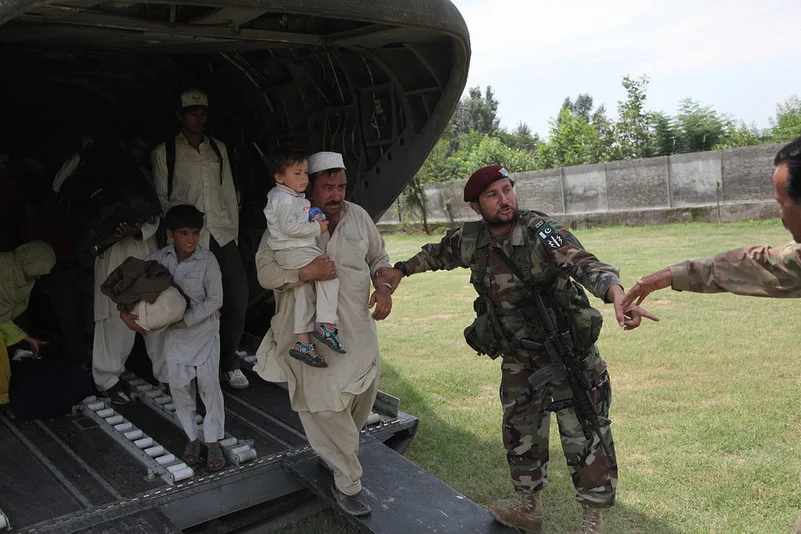
Earlier this month in Abu Dhabi, a groundbreaking blueprint for the long-awaited ‘loss and damage’ fund was agreed upon after a hard-fought battle by the G77 and COP28 presidency.
The decision — which will be formally adopted at the COP28 summit next week — rests on the World Bank acting as the administrator, or middleman, that would control negotiations and timelines around the distribution of any funds to those on the frontline of climate change, the Global South.
Although a major breakthrough for those who have waited years for climate reparations, there is still work to be done — especially when it comes to guaranteeing the Global North’s participation in financing Loss and Damage, and ensuring the Global South has representation and oversight on the Bank’s board.
Fortunately, the final draft text established a supervisory role for developing nations on the fund’s board and restricted the World Bank’s involvement to an interim four-year term — largely seen as the last-minute move which salvaged loss and damage negotiations.
In fact, the COP28 agenda has made climate finance and inclusivity the very essence of this year’s COP.
For example, the UAE has pledged $4.5bn [€4.3bn] to finance African Climate Projects and $300bn for various renewable projects this decade.
However, the situation around loss and damage is still uncertain.
The US — who had originally suggested the World Bank as the host, but then abstained from signing off on the final agreement — could once again hinder the prospects of a global climate agreement at COP28, thought of as the last climate summit before humanity reaches the point of no return.
And this would be a disaster.
Since COP27 — when a loss and damage fund was initially agreed upon — we have seen countries like Pakistan and Libya ravaged by climate change-induced catastrophe. But these countries have yet to benefit from the promises made in Sharm El-Sheikh, and many continue arduous and lengthy recovery alone.
While the Global North is responsible for the vast majority of historic CO2 emissions, the Global South pays the price: apocalyptic floods, droughts, storms — we are on the frontlines of climate change but do not have the resources to prepare, fight, or recover.
This has been a decades-long battle. One that the Global North, spearheaded by the US, have attempted to derail. Their measures have ranged from advocating for contributions to be voluntary and not legally-binding, to challenging the basis of participation, suggesting it should not be linked to historical emissions.
Initially, the decision for the World Bank to host the fund threatened loss and damage talks due to negative perceptions across Global South countries.
Many thought this would be just another instance where control is handed to Western powers, while stripping agency from the Global South over much-needed solutions.
And for good reason. The World Bank’s approach to international development has been notoriously criticised.
For instance, it has long ignored human rights, operated from a place of little accountability, and been accused (by the UN) of benefiting wealthy states and ignoring the poor.
However, recent reforms have been a step in the right direction.
For example, the World Bank’s recent move to prioritise climate change in its anti-poverty mandate, despite facing pushback from major stakeholders like Russia and Saudi Arabia to continue investing in fossil fuels, is a positive development. This indicates a growing recognition of the importance of environmental sustainability in global economic policies.
But the Bank can’t stop there.
If it has not been clear before, for the Global South, we are already amid a crisis — and that crisis demands consensus on Loss and Damage. The Global North must do away with colonial-era notions that Global South countries are incapable of managing their own affairs and need high-handed benevolence.
As the late Saleemul Huq — who championed Loss and Damage for 10 years — stated: “Loss and Damage isn’t aid. When money is given as aid, all the power rests with the donor. It is an unequal relationship.”
Huq recognised the importance of equitable decision-making, where the Global South was represented and heard in a space dominated by Western powers. Negotiators must realise that if the international community does not provide space for agency and autonomy, there is no path forward. And we all suffer.
The priority for the Global South, and anyone who cares about climate action, should be ensuring that the World Bank accurately measures climate vulnerability and causation, and ensures direct contact between donor and recipient.
This means ensuring that the board is comprised of sustainable development and loss and damage experts from the Global South who would serve to guide both parties on financing priorities. These measures would ensure that Global South countries are able to actively and freely negotiate funds, their allocation, and their resilience-building agendas directly with Loss and Damage funders.
Ultimately, loss and damage is too important to risk being treated as another ‘international development’ tool in the arsenal of Western- backed institutions.
Instead, these funds are rightfully owed to the Global South, and must therefore be controlled by the Global South.


